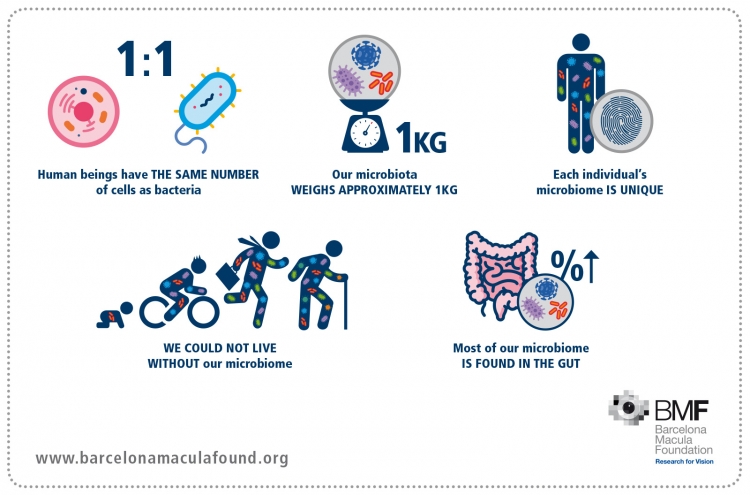The Barcelona Macula Foundation participates in the Microbeyeome research project, which studies the relationship between the microbiome and AMD

With the premise that the microbiome is potentially modifiable, the MICROBEYEOME study aims to analyse the intestinal and oral microbiota of patients diagnosed with AMD in order to open new avenues of research for the prevention and treatment of the illness. Candidates are currently being selected.
The Barcelona Macula Foundation (BMF) and the Centre for Genomic Regulation (CRG), in close collaboration with the Institut de la Màcula, have commenced the MICROBEYEOME research project. This aims to analyse the intestinal and oral microbiota of patients diagnosed with age-related macular degeneration (AMD).
The main aim of the study is to characterise the oral and intestinal microbiome of patients through RNA 16S sequencing and compare it with the microbiome of healthy patients, as well as to discover differences between different AMD phenotypes.
This means it could be possible to identify whether a single microbial composition is associated with a specific phenotype. Due to the fact that the microbiome is potentially modifiable, this study could open new avenues of research for AMD prevention and/or its possible treatments.
At present, this opening phase of the MICROBEYEOME study corresponds to the selection of possible participating candidates through a single visit. The main inclusion criteria are as follows:
- Patients of over 50, both those diagnosed with AMD and healthy patients.
- Patients must not have taken antibiotics in the past three months.
- Patients with other neurodegenerative diseases such as Alzheimer’s or Parkinson’s disease, or those in treatment for any type of cancer, are excluded.
The microbiome is the ecosystem formed by the microorganisms that inhabit our body, mainly in the intestine, which until a few years ago, were referred to as intestinal flora in the belief that they belonged to the plant kingdom.
Every individual hosts a unique microbiome that, in combination with its genetics, will play a key role in both health and disease. The microbiome maintains a constant relationship with the immune system: any unbalancing can set off a pathological process. In addition, its functions are found in the digestive process, extracting nutrients and producing vitamins.
Recent years have led to the discovery of the relationship between the microbiome and neurodegenerative diseases such as Parkinson’s or Alzheimer’s disease, neurodevelopmental disorders such as autism spectrum disorder (ASD) or metabolic syndromes such as type II diabetes.
Recent studies suggest that the microbiome may also play an important role in eye diseases like uveitis or exudative AMD. What has yet to be demonstrated is whether the changes observed in the microbiota are the cause or consequence of the disease.
In December, the Associació Discapacitat Visual Catalunya: B1+B2+B3, which advises and accompanies visually-impaired people and holds the City of Barcelona’s Medal of Honour, awarded the Barcelona Macula Foundation the 25,000€ First Prize for Research into Visual Diseases for this research project. The awarding jury comprised members of the the Catalan Society of Ophthalmology and of the Official College of Opticians and Optometrists of Catalonia.
In this video (in Spanish), Dr Jordi Monés, MD, PhD, explains the microbiome, the changes it may undergo throughout life and how it affects our health: